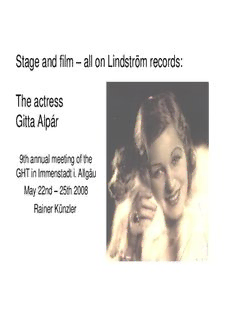
Stage and film all on Lindström records: The actress Gitta Alpár PDF
Preview Stage and film all on Lindström records: The actress Gitta Alpár
Stage and film – all on Lindström records: The actress Gitta Alpár 9th annual meeting of the GHT in Immenstadt i. Allgäu May 22nd – 25th 2008 Rainer Künzler Stage and film - all on Lindström records: The actress Gitta Alpár Overview • Youth in Budapest • Her first success on stage • Engagements in Munich and Berlin • Her first recordings on Homocord • 1930: Change to the operetta • Lindström recordings 1930 – 33 • German talking films up to 1933 • Repertoire and marketing • Emigration to Vienna • Engagements allover Europe • Emigration to the US • Conclusion and outlook Stage and film - all on Lindström records: The actress Gitta Alpár Youth in Budapest born on 5 March 1903 as Margit Klopfer Father: Ignác Klopfer, cantor at the main synagogue in Dohány utca first music lessons by her mother 1919 – end of 1923: vocal education at the Music Academy by Laura Hilgermann Stage and film - all on Lindström records: The actress Gitta Alpár Her first success on stage 1924 january: First appearance in Budapest State Opera argument between direktor Miklós Radnai und star soprano Erzsi Sándor Alpár replaces Sándor as Lakmé in „Lakmé“ (Delibes) 1 January 1924: Alpár already performs as Gilda in „Rigoletto“ Engagement at „Király Színház“ operetta theatre located in Király utca Stage and film - all on Lindström records: The actress Gitta Alpár Engagements in Munich and Berlin 1925 – 1927: Engagement at the opera house of Munich 1927: debut at State Opera, Vienna 1927 – 1930: State Opera Berlin on invitation of Erich Kleiber Marriage with her first husband Kornél Stangl Stage and film - all on Lindström records: The actress Gitta Alpár Her first recordings on Homocord opara arias Hungarian folk songs in U- / H-U- export series recording activita about 1927 - 30 Stage and film - all on Lindström records: The actress Gitta Alpár Her first recordings on Homocord Gitta Alpár: Gilda‘s aria from „Rigoletto“ M: Giuseppe Verdi M-52361 Ho 4-9003 rec. 23 Feb. 1929 (?) Stage and film - all on Lindström records: The actress Gitta Alpár 1930: Change to the operetta – new label Odeon / Parlophon 1930: first role in Millöcker‘s „Bettelstudent“ at the Metropol theatre 1930: First great succes wirh Richard Tauber in Lehár‘s „Schön ist die Welt“ (Odeon / Parlophon) Berliner Lokal-Anzeiger: This is Lehár, this is Tauber, that means succes. Gitta Alpár is the amazing success of the evening, enchanting with each of her tones, clear as a bell. 1930: Title role in Kálmán‘s „Veilchen vom Montmartre“ (Odeon) first Lindström recordings: November 1930 on Odeon – probably exclusive contract Stage and film - all on Lindström records: 1930: Change to the operetta – new label Odeon / The actress Gitta Alpár Parlophon Gitta Alpár: Bin verliebt, bin so verliebt Song from „Schön ist die Welt“ (M: Franz Lehár; T: Ludwig Herzer and Fritz Löhner) accomp. by the orchestra of the Metropol theatre, Berlin Be 9273 Od O-11360 rec. 28 Nov 1930 Stage and film - all on Lindström records: The actress Gitta Alpár 1930: Change to the operetta – new label Odeon / Parlophon 1931: „Die Dubarry“ re-edited byTheo Mackeben (Odeon / Parlophon) „her role“ 5 April 1931: Marriage with her second husband Gustav Fröhlich
Description: